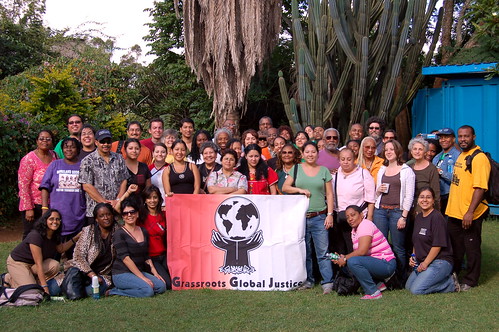Friday, January 19, 2007
Informal Schools in Korogocho
In Korogocho, organizing youth was a major theme for starting the informal schools. Two networks we visited, the Altawoon and the Great Hope project, use volunteers as teachers. Since government schools are limited, not all children have the ability to go to schools. The unique difference in the two networks were that they were created by youth to empower the youth of the Korogocho.
Altawoon, which means unity, began in 1992 as a study group. Today, the network has four projects two of which are education and a clinic. The education aspect had a small school with 200 students, a library for the community, and a adult literacy program. A lot of municpal programs falls on the local community's shoulders due to the fact that the government hasn't provided.
The Great Hope Project, is a school with students people leaving with HIV/ AIDS. Some of the children are from single parents or orphans, that families can't afford to keep the children. The teachers are untrained volunteers from the area, who want recogition and training from the government.
- by Teraya
Waste is not waste until wasted

We went to Korogocho, which at 200,000 has the largest slum population in Nairobi. One of the biggest problems in the community is around the environment and garbage. The slums are right next to a landfill where all the garbage in Nairobi is dumped. There is a lot of illegal dumping, and when the toxins from the garbage combusts, all the gas floats into the community endangering the lives of its residents.
The community's response to this problem (and many others) has been to organize young people. In this case, young people go around to collect garbage from individual homes to bring to the dumpsite, which alleviates illegal dumping, provides clean water for showers, and encourages community-wide recycling, among other benefits.
It was a humbling experience, thinking about how much garbage I threw out just before packing for this trip. The culture of consumption in the US has spread globally and the impact of things we take for granted becomes someone else's problem in their backyard. The idea that waste is not waste until wasted is one that I want to think about especially in terms of my own practice and consciousness.
On a personal level, being part of the GGJ delegation has been great. As I write, the communications team who put this blog together is reflecting on the day together. Having this time and space to talk, debate, and share different perspectives is just as much a part of the experience as being in Kenya and learning about the context of struggle in this country. I am thankful to have the privilege to be in this space.
by Helena/CAAAV
photo by Ansje Miller

As part of the orientation for GGJ delegates to Nairobi, the Five C's gave a performance that provided a glimpse of what to expect from our participation in this year's World Social Forum.
The group, composed of long-time Kenyan activists, performed in Swahili and English, using both traditional and popular music. In the picture here, the Five C's are singing a piece they titled, "Another World is Possible." The Five C's were invited to perform for the GGJ delegation by one of our local hosts, Njoki Njehu.
-
by Carlos/Chicago JWJ
Thursday, January 18, 2007
Welcome To World Social Forum- Kenya
GGJ Mission
Grassroots Global Justice is an alliance of U.S.-based grassroots groups who are organizing to build an agenda for power for working and poor people. We understand that there are important connections between the local issues we work on and the global context, and we see ourselves as part of an international movement for global justice.
We believe that movement building is grounded in the development of grassroots organizations and leadership development to achieve local, national, and global justice.
We believe in building relationships of solidarity between and among organizations in the United States and across the world. We have much to learn from and share with our international allies.
We believe that as a US based organizations, we must be committed to building a strong enough movement to prevent the US government and US corporations from suppressing popular movements and interfering in the internal affairs of other countries.
We believe in creating opportunities for convergence that facilitate resource sharing, popular and political education, skill sharing and dialogue between organizations.
We believe in joint action, that acting together in the U.S. and globally we have more power to create social change.
We believe by working together — Another World is Possible, a world based on the principles of international solidarity, justice, peace, dignity, equality, human rights, sustainability and democracy!